| MOMENTOS Compendio PoéticoFederico Arcos Ilustraciones de 1976 |
 |
A life, gone, into eternal sleep… A body, lying in state…Perhaps, to die, is to be free. F.A. |
| Esta labor ha sido realizada con trabajo voluntario, comprendida la labor artística hasta el de imprenta y encuadernación en el que ha participado el autor, conforme a las caracteristicas de Black and Red, sin que nadie reciba remuneración alguna.
Black & Red |
This work has been completed in its entirety, Including the artistic component, the printing, and binding with the participation of the author and by volunteer labor without any remuneration in keeping with the tradition of Black and Red.
Black & Red |
| El autor desea expresar su agradecimiento al viejo amigo, el artista Alfredo Monrós, por las hermosas ilustraciones y su valiosa ayuda; a los amigos Fredy y Lorraine Perlman por el trabajo de imprenta; y a V., a M. y a J. que animaron a llevar a cabo este librito. | The author wishes to express his gratitude to an old friend, the painter Alfred Monrós, for the beautiful drawings and his valuable assistance; I also wish to thank my friends Fredy and Lorraine Perlman for their help in the printing process and V., M., and J., whose encouragement helped the completion of this little book. |
| En memoria de mis padres, que me dieron el ser y heredé los sentimientos; y de mis hermanos que, en mi infancia, supieron cultivarlos. Y en recuerdo de El Viejo Mari y de Memé Dolores; y a todos los que, unidos en fraternal sentir y de ideas, fueron merecedores de su estima. | To the memory of my parents who gave me life and from whom I inherited feelings; and of my siblings who, in childhood, knew how to nurture those feelings. This book is also a remembrance of El Viejo Mari and of Memé Delores, and of all those who, united in a brotherly feeling and ideas, were worthy of its esteem. |
| ¿Qué es un día? ¿Qué es un año? ¿Qué es una vida? Nada. ¿Qué es un recuerdo? Toda una vida. |
What is a day? What is a year? What is a lifetime? Nothing. What is a memory? An entire lifetime. |
| ¿Morir? ¿Vivir? Soñar, nada más. |
To be born? To die? To live? To dream, Nothing more. |
| Más allá de la vida está la muerte. Más allá del amor está el dolor. Más allá del dolor, La Nada. |
Beyond life is death. Beyond love is pain. Beyond pain… the nothingness. |
| La vida muestra su dardo; el alma imprime su celo. ¿Existe algo de humano donde no se vive en duelo? |
Life shows its dart; the soul imprints its zeal. Does something human exist where one does not live in sorrow? |
| No se puede contar el infinito, ni concebir la eternidad; pero hay realidades intangibles que no podemos ignorar. |
You can’t count infinity, nor conceive of eternity; but there are intangible realities we cannot ignore. |
| Yo sé que hay inquietudes que, al hombre, le impiden, sobre todo, el razonar; y sentimientos agitados, fuertes, que le ahogan, incluso, en su sed de amar. |
I know there are anxieties, that above all, impede man from reason; and strong, restless feelings which drown him, even in his thirst for love. |
| Solo. Completamente solo; escuchando la elocuencia del silencio. Solo. sin más compañía que los recuerdos y los pensamientos. Solo; sin más alientos ni más deseos que las angustias y los pasados desvelos. Solo, sin más esperanzas ni más anhelos que matar un pasado de torturantes recuerdos Solo, sin más ilusión y sin más guía que ahogar un recuerdo tristeza de hoy. sin agonía. Solo. Solo, renunciando a todo, incluso, a la propia vida. |
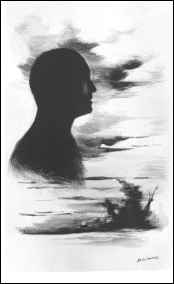 |
Alone. Completely alone; listening to the eloquence of silence. Alone; without more company than my memories and my thoughts. Alone; without more spirits nor more desires than the griefs and the past anxieties. Alone; without more hopes or more longings than to kill a past of tormenting memories. Alone; without more illusion and without more guide, than to drown a memory, today’s sadness without agony. Alone. Alone; renouncing everything including life itself. |
| No me digas que en la vida hay esperanzas y ensueños; si los hubo se han perdido; pues yo vivo sin ellos. |
Don’t tell me There are hopes And dreams. If there were, They’ve been lost; Well, I live without them. |
| Un estremecimiento nuevo puede, quizás, llegar a percibir el corazón; nacerá envuelto en celo y creará, con sutil sentir, una ilusión. Y después, empujado por la brisa, morirá, como evocación que pasa deprisa, y alejandose vá… |
A new tremor can, perhaps, be perceived by the heart; it will come to life enveloped in zeal and it will create with subtle feeling, an illusion. And, then, impelled by the breeze, it will perish, as the evocation which passes quickly and, moving away, takes leave… |
| El Hombre vive en la sombra; la sombra no deja al Hombre; son tinieblas del espacio; razones que nunca cesan de flotar sobre las mentes como notas inseguras de una vida inexistente. |
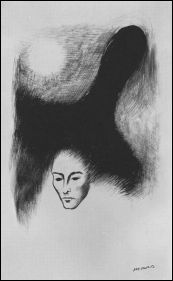 |
Man lives in shadow; the shadows do not leave Man; they are darkness in space; reasons which never cease to float over the minds like uncertain notes of an non-existent life. |
| Tarde triste; tarde oscura; lúgubre esperanza, ilusión perdida; tarde solitaria; evocación muda. Lutos son las horas llenas de agonía. |
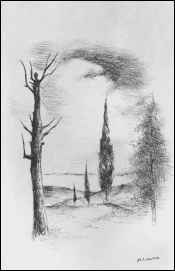 |
Sad evening; dark evening; dismal hope; lost illusion; lonely evening; mute evocation. Mourning are the hours full of agony. |
| No te inquietes. No te inquietes. ¿Para qué inquietarte, amigo? Qué importa que luches y pienses; o busques, en vano, la dicha. ¿Acaso has olvidado que en el cenagoso campo de la vida ya no hay simientes que crezcan, ni capullos florecientes, ni esperanzas, ni ilusiones, ni alegrías, y que el mundo marcha solo, triste, lúgubre, —sin brújula, norte ni guía— hacia el ocaso desesperado y en inevitable agonla? ¿Buscas afectos? … bondades? … ¿Almas sensitivas? Sólo hallaras vanidades, envidias y bajezas mezquinas. No te Inquietes. No te Inquietes. ¿Para qué Inquietarte, amigo? |
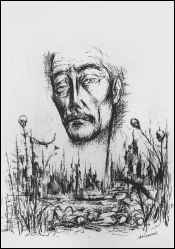 |
Don’t worry. Don’t worry. Why worry, friend? What does it matter that you struggle and think; or seek, in vain, happiness? Have you perhaps forgotten that in the muddy field of life there are no longer seeds that will grow, nor flowering blossoms, nor hopes, nor illusions, nor joy, and that the world marches on alone, sadly, lugubriously, —without compass, north star, or guide— toward a desperate sunset and in an inevitable agony? You seek affection? Kindness? Sensitive souls? You shall find only vanities, envy and wretched baseness. Don’t worry. Don’t worry. Why worry, friend? |
| Contra las alas rojas del destino. Contra las fuerzas vivas del dolor; ahogando las llamas de la esperanza, comprimiendo los latidos del corazón, marcha El Hombre, marcho yo, espíritu inquieto, fuente de amor, buscando, en la guerra, la calma; la paz, en la desesperación. |
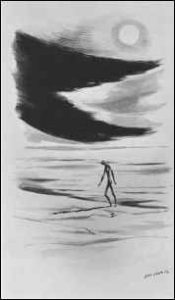 |
Against the red wings of destiny; against the vibrant forces of pain: smothering the flames of hope; arresting the heart beats, marches man, I march, restless spirit, full of love, in the midst of war, searching for calm, in the midst of despair, peace. |
| Cual Titanes que, un tiempo, perdieron la fuerza: o Hercúleo Adalid que, sin té, sucumbió; cual grandeza extinguida, o perdido en La Nada, asi murió el sueno que la mente creó. |
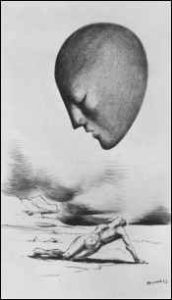 |
Like the titans who, once lost their power; or Hercules the champion, who succumbed without faith; Like greatness extinguished, or lost in the void, so died the dream that the mind made. |
| Avalanchas de muerte se estrellaron en las costas normandas: Otra guerra que fué farsa humana. |
Avalanches of death crashed on the Normandy coasts: Another war that was a human farce. |
| Rebelde es el ser que da impulso a la vida. Rebelde es el ser que hace frente al dolor. Rebelde. Rebelde. Rebelde, soy yo. |
Rebel is the being who gives force to life. Rebel is the being who confronts suffering. Rebel. Rebel. Rebel am I. |
|
PALOMAS BLANCAS
Palomas blancas. Palomas blancas —Agosto de 1960. Año 15 de Hiroshima. |
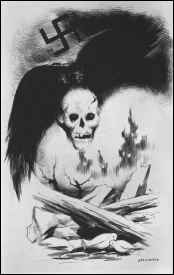 |
WHITE DOVES
White doves. White doves —August 1960, Hiroshima 15 years on |
|
VIETNAM
Dentelladas METRALLA… |
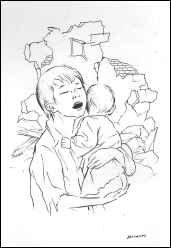 |
VIETNAM
Incisions SHRAPNEL… |
| En el cementerio de Waldheim, ante el monumento a los Mártires de Chicago.
WALDHEIM
Está de luto La Idea. —11 de noviembre de 1962 |
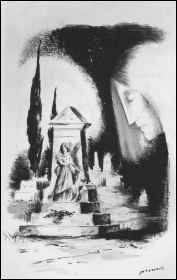 |
In the Waldheim cemetery, at the monument of the Haymarket Martyrs
WALDHEIM
The Idea is in mourning, —November 11, 1962 |
| Como las estrellas, la noche; como el sol, el día; el alba, la mañana; la flor, el pétalo; la abeja, el néctar; la colmena, la miel; el enamorado, la amada; así se lleva El Ideal en el pensamiento y en el corazón |
Like the stars, the night; like the sun, the day; the dawn, the morning; the flower, the petal; the bee, the nectar the beehive, the honey; the lover, the beloved Thus the Ideal is carried, in thought and heart. |
| En memoria del Dr. Martin Luther King, Jr.
LO SABÍAS
Sí, —6 de abril de 1968 |
In memory of Dr. Martin Luther King Jr.
YOU KNEW
Yes, —April 6, 1968 |
| En recuerdo de mi querido Viejo Vicente Mari.
EMPIREA
Aunque los continentes se sumerjan; Aunque los polos se compriman Aunque el Universo pierda su ritmo Aunque la Eternidad sea hoy; Aunque todo se pierda; Siempre habrá una llama, |
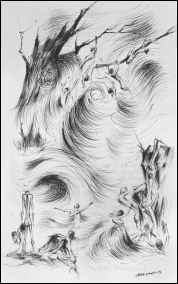 |
In memory of Vicente Mari
EMPYREAN
Though the continents sink, |
| En memoria de Dolores Gómez (1896-1964), con la estima que siempre mereció. LA MADRE ESPIRITUAL
No. Dolores. Tú no has muerto. No. Dolores. Tú no has muerto. —5 de diciembre de 1964 |
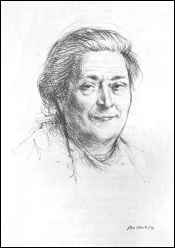 |
In memory of Dolores Gómez (1896-1964), with the esteem she always deserved THE SPIRITUAL MOTHER
No, Dolores. You have not died; —December 5, 1964 |
|
CASIANO EDO
(10 de enero de 1890-28 de noviembre de 1973) Tenía ochenta y tres años; —30 de noviembre de 1973 |
CASIANO EDO
(January 10, 1890-November 28, 1973) Eighty-three years old was he, bordering on eighty-four; —November 30, 1973 |
| MIGUEL MATEO
(17 de enero de 1904-15 de noviembre de 1974) Cayeron |
MIGUEL MATEO
(January 17, 1904-November 15, 1974) There fell, |
| LA PARCA
va llevándose |
THE PARCA
go on carrying off |
| Ayer, cuando un aire de lágrima triste lo envolvía todo sin poder ver, ni sentir, nl pensar, y un cielo gris ensombrecía el alma sin esperanza, tenues las pulsaciones, débil el aliento, acabándose una vida, adiós postrero hacia el vacío eterno, me di cuenta de que ni fuimos, ni somos, ni jamás seremos, porque todo es vacío, vacío, de principio a fin. |
Yesterday, when an air of sad tears surrounded everything, without being able to see, nor feel, nor think, and a gray cloud enshadowed the hopeless soul, the pulses tenuous, the breathing weak, a life was ending, one final goodbye toward the eternal void, I realized that we neither were, nor are, nor will we ever be, because all is empty, empty, from the beginning to the end. |
|
EVOCACIÓN
Cantaba el poeta: |
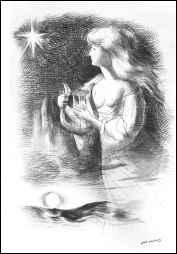 |
EVOCATION
Sang the poet: But when, at last, the poet |
| En esta montaña hay calma, En esta montaña hay paz. Paz, calme, sosiego… Lo que necesitamos más. Sin ello el mundo se pierde; sin ello el mundo se va. ¡Qué dicha en este monte al hallar la soledad! La soledad de uno mismo que invita a meditar. Lejos de lo mundano; cerca de la verdad. La verdad, lo que se quiere; lo que se desea ya; donde corazón y sentimiento se llegarán a encontrar, entonces como una antorcha una ilusión nacerá y una esperanza la vida de pronto revelará. Aqui, en este monte, al alcance de la mano está. |
On this mountain there is calm; on this mountain there is peace. Peace, calm, and serenity, what we most need. Without it the world is lost; without it the world vanishes. What joy on this mountain to find solitude! The solitude of oneself— which inspires meditation. Far from the mundane; close to the truth. The truth, which one wishes for, which is desired always. Where the heart and sentiment will come to meet, and then, like a torch, an illusion will be born, and life will suddenly reveal a hope! Here on this mountain, it is at hand. |
| En azul, de inmensidad del mar; como el cielo infinito; lo mismo que el zafiro, igual que el lapis lázuli, así, los sueños nacen. Con ansias de gozar y en la mente descritos, radiantes de cariño, se escuchan dulces cánticos en rítmico son. |
As the blue, of the immensity of the ocean; as the infinite sky; the same as the sapphire, like the lapis lazuli, thus, are dreams. With longings of joys and in the mind delineated, radiant with love, are heard sweet songs with rhythmical beat. |
| Gutural carcajada que muestra el inicio de tus dos primeros dientes. Gatear inseguro, preludio de tus tempranos pasos. Manos curiosas se extienden asiendo los objetos. Vivacidad inquieta de un mundo que se abre ante tus ojos. Asi, tu Infantil aureola conquista el cariño de todos. |
A gutteral burst of laughter which shows the white of your first two teeth. Unsteady crawl, prelude of your early steps. Curious hands reach out grabbing things. A vivacity anxious for a world which opens up before your eyes. Thus, your infantile radiance conquers everyone’s love. |
| Risas de niño levantan mi corazón en vuelo: Victoria de alas hacia lo eterno. |
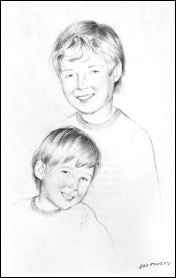 |
Children’s laughter lift my heart in flight: a winged victory toward the eternal. |
| Mi alma vaga, peregrina, por los parajes de Francia, en pos de almas amigas, mis afectos, y mis ansias. |
My soul roves wandering over the countryside of France in search of fond souls, my affections, and my yearning. |
| Qué bueno, galopar en la grupa de mi pensamiento, arrollando distancias y anulando el tiempo. |
How wonderful to gallop in the saddle of my thought sweeping away distances and obliterating time. |
| Se han abierto las flores. Ha nacido el color. La primavera florece y, con ella, la ilusión. |
The flowers have opened. Color has been born. Spring flourishes and, with it, happiness. |
| De la rosa, gotas de rocío se deslizan en perlas cristalinas. |
Dew drops roll off the rose in crystalline pearls… |
| Balanceándose, llueven hojas secas de los altos robles; mientras, inquietas y vivaces, las ardillas se proveen. |
Swaying dry leaves rain down from the tall oaks; while, anxious and vivacious, the squirrels procure their hoard. |
| Raudas, en torbellino, vagan, perdidas, las hojas muertas; desnudos, tristes, desamparados, los robles quedan. |
Swiftly, in a whirlwind, heedlessly the dead leaves roam; the oak trees bare, sad, are left forsaken. |
| Flota y ondea, en el aire, la hoja seca, despidiéndose en su últimoa diós… |
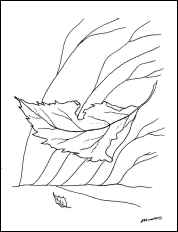 |
The dry leaf floats and wafts in the air, bidding farewell in its last adieu. |
| Me has vuelto a mis sentidos; me has brindado la paz; has hecho tu mundo mío abriéndote de par en par; contigo canta la vida en un lindo despertar; susurras palabras dulces; me haces sentir y amar; mis pesares se han ido, no volveré a llorar; los pensamientos siniestros también ya muertos están, y quiero cantar contigo, y contigo quiero amar; amaré lo que es hermoso y te cantaré en solaz ¡que todo lo bello del mundo en un abrazo me das! |
You have brought me back to my senses; you have given me peace. Offering yourself completely you have made your world mine. Life sings with you in a beautiful awakening; soft sweet words you make me feel and love. My woes have left me; I shall not cry again. Dark thoughts, too, are dead. And I want to sing with you, and with you I want to love. I shall love what is beautiful and in the stillness, shall sing to you that all which is beautiful in the world you give me in an embrace. |
| Contigo río, si ríes. Lloro, contigo, si lloras. Porque somos, lo que somos; sentimos como sentimos, y, sentimos, los dos, lo mismo. |
I laugh with you if you laugh. I cry with you, if you cry. Because we are what we are; we feel as we feel; and we two feel as one. |
| Tu mundo, ese mundo tuyo que me ofreciste un día, también me pertenece. No es sólo tuyo. Se fundió con el mió. Porque tú y yo; uno y uno; los dos como unidad, somos ya uno; y uno es, éste, nuestro mundo. |
Your world, this world of yours which one day you opened up to me, is not yours alone; it also belongs to me because you and I, one and one; the two of us as a unity, who are already one— and one is this… our world. |
|
ELEGIA AL LLANTO El llanto |
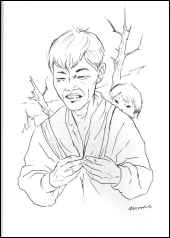 |
ELEGY TO TEARS Tears |
| Libre desplegando sus alas, se eleva el cóndor; vislumbra, surcando el cielo, horizontes de luz. |
Free, spreading his wings, the condor soars; it glimpses, streaking through the sky, horizons of light. |
| Del huracán remolino. En el remolino, polvo. Entre el polvo, semilla. De la semilla, vida. Y, la vida, !Vivirla! |
From the hurricane, whirlwind; in the whirlwind, dust; in the dust, a seed; From the seed, life; And life… Live it! |
| Quien pudiera levantar a pulso el mundo; o abarcar la humanidad en un abrazo. |
Would that I could lift the world on my own or, hold all humanity in my arms. |
| Ya desde el año 1939, los jóvenes libertarios pagaron con un precio muy elevado de vidas su resistencia al franquismo; acorralado por las fuerzas represivas policíacas en el monte de Montjuïc en Barcelona, Raúl Carballeira, figura prominente de la organización libertaria clandestina en España, fue uno más en esta inacabable suma.
RAUL CARBALLEIRA
(28 de febrero de 1918 – 26 de junio de 1948) Segaron tu cuerpo joven, Grito, y grito con fuerza. |
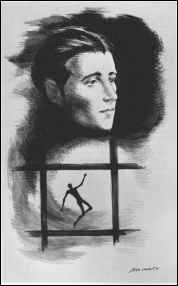 |
Since 1939, young anarchists in Spain have paid the price for resisting Francoism. Raul Carballeira, a prominent figure in the anarchist underground, was one who paid the ultimate price when surrounded by police on Montjuïc Mountain in Barcelona.
RAUL CARBALLEIRA
(February 28, 1918-June 26, 1948) Bursts of shrapnel I cry out and I cry out with vehemence; |
